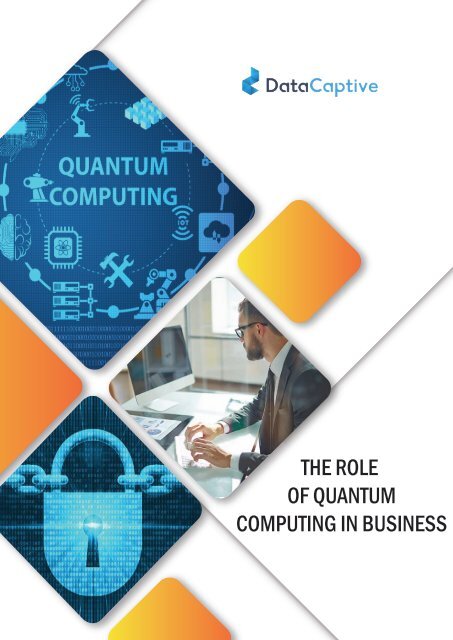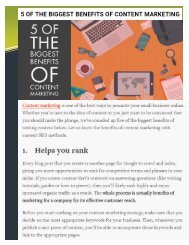THE ROLE OF QUANTUM COMPUTING IN BUSINESS
Excited about Quantum Computing? Want to incorporate this new age technology into your business? Read, ‘THE ROLE OF QUANTUM COMPUTING IN BUSINESS’ and gain complete insights on this topic! What more are you waiting for? Read, Refine & Revamp your business now!
Excited about Quantum Computing? Want to incorporate this new age technology into your business? Read, ‘THE ROLE OF QUANTUM COMPUTING IN BUSINESS’ and gain complete insights on this topic! What more are you waiting for? Read, Refine & Revamp your business now!
Create successful ePaper yourself
Turn your PDF publications into a flip-book with our unique Google optimized e-Paper software.
<strong>THE</strong> <strong>ROLE</strong><br />
<strong>OF</strong> <strong>QUANTUM</strong><br />
<strong>COMPUT<strong>IN</strong>G</strong> <strong>IN</strong> BUS<strong>IN</strong>ESS
TABLE <strong>OF</strong> CONTENTS<br />
1. Introduction ..................................................................................1<br />
2. What is quantum computing?........................................................2<br />
3. How quantum computers work?.....................................................2<br />
4. What are superposition and entanglement?...................................3<br />
5. What is decoherence?...................................................................3<br />
6. What are coherence length and Quantum Error Correction?............4<br />
7. What is quantum supremacy?........................................................4<br />
8. What is Dynamic Decoupling?........................................................4<br />
9. Role of Quantum computers in business.........................................5<br />
10. Four basic quantum business models to make money...................7<br />
11. Types of quantum computers........................................................9<br />
12. Companies that are advancing in quantum computing<br />
research Conclusion& References...............................................10<br />
13. Conclusion..................................................................................12
<strong>THE</strong> <strong>ROLE</strong> <strong>OF</strong> <strong>QUANTUM</strong> <strong>COMPUT<strong>IN</strong>G</strong> <strong>IN</strong> BUS<strong>IN</strong>ESS<br />
Introduction<br />
Let us make an unfair but a detailed comparison. One mind that follows<br />
traditional computing and another that follows quantum computing through<br />
history.<br />
Napoleon Bonaparte compartmentalized the mastery of all the subjects in his<br />
mind. When his mind thought about one topic, it didn’t think of another.<br />
Napoleon’s mind correctly followed traditional computing. He maintained his<br />
knowledge like cupboards. When he opens one cupboard (subject), other<br />
remain closed. He performed the tasks one by one.<br />
If there was one mind that followed advanced quantum computing, it<br />
belonged to the Indian mathematical prodigy Srinivasa Ramanujan. His prime<br />
number theorem, infinitive theory, and partition number equations led to<br />
advanced research in quantum computing. It broke many complexities in the<br />
real-world applications.<br />
Imagine your computers working in three or more independent states<br />
simultaneously with a stronger correlation to bring out the solution. Is it possible?<br />
Of course. It is where Quantum computing comes to play.<br />
Quantum Computing is a buzzword for the computing world. It is already<br />
creating some ripples in the business world. Businesses compete hard to make<br />
giant strides towards the execution of quantum computing. If implemented, it<br />
would mark a new revolution in industries.<br />
Unproductive humans who think and work like machines turn mechanical<br />
Unproductive machines that run errands resist as humans become impractical<br />
1
WHAT IS <strong>QUANTUM</strong> <strong>COMPUT<strong>IN</strong>G</strong>?<br />
Quantum computing is a field in computing technology that utilizes the<br />
principle of Quantum mechanics. Quantum computing performs<br />
computations that are no longer possible. It performs calculations that a<br />
regular computer cannot achieve.<br />
Quantum computing unfolds many computations for varieties of<br />
head-crunching complex problems. Businesses are burning in the midnight oil<br />
to bring some breakthrough in quantum computing.<br />
None can deny the fact that quantum computing is in the stages of infancy.<br />
However, ten years from now quantum computing is expected to have drastic<br />
improvements, or it can turn the business world more competitive.<br />
HOW <strong>QUANTUM</strong> COMPUTERS WORK?<br />
Physicists, mathematicians, computer specialists, tech experts all over the<br />
world are trying to experiment the working of the Quantum computers. The<br />
standard traditional computers take the information in your language as 0 and<br />
1.<br />
Traditional computers cannot perform the complex, simultaneous possibilities<br />
at the same time. They execute the multiple varied computations one by one.<br />
Here is where quantum computing leads the way.<br />
The study of quantum computing derives from the behavior of subatomic<br />
particles that do not confine to the regular laws of physics. The behavior of<br />
sub-atomic elements developed a new study of quantum physics.<br />
Quantum computers store the information in the form of qubit or the quantum<br />
bit. These qubits process and compute the different computations at a single<br />
instance. Qubits can exist in both states simultaneously or other states in<br />
between.<br />
The qubits represent 0 or 1 or both simultaneously. It could process all the<br />
possibilities at the same time and provide accurate results.<br />
2
WHAT ARE SUPERPOSITION AND ENTANGLEMENT?<br />
Superposition and entanglement are the two essential principles behind<br />
quantum computing.<br />
Superposition is the ability of the quantum computing system to remain in<br />
multiple states at the same time whereas Entanglement denotes a strong<br />
correlation between the two particles even if they are separated and stay in<br />
longer distances. The two quantum particles are linked in unison even when<br />
great distances separate them. Entanglement is also mentioned as the<br />
correlation between the qubits.<br />
When two qubits in a superposition are entangled, certain operations on one<br />
have immediate effects on the other, a process that helps quantum algorithms<br />
be more powerful than conventional ones.<br />
The impossible connection in entanglement caused Albert Einstein to explain<br />
them as “spooky action at a distance.”<br />
Do you know?<br />
One qubit quantum device can compute two calculations at the same time.<br />
A two-qubit quantum system can calculate four predictions at the same time.<br />
A 1000 qubit quantum system can process more simultaneous calculations<br />
than there are particles in the known universe. If there is a drop-out called<br />
decoherence, qubits lose their useful ambiguity and become usual 0 and 1.<br />
WHAT IS DECOHERENCE?<br />
Decoherence is the process of disturbing the quantum interactions in a system<br />
to turn it to traditional in communications. Any small sound, vibration or<br />
movement can affect a coin to a neutral state to turn towards head or tails.<br />
Entanglement provides more computational power as extra qubits are added<br />
to the system. It doubles the number of parallel operations.<br />
3
Do you know?<br />
Approximately, three hundred perfectly entangled qubits in superposition,<br />
could map all the information in the universe starting from the Big Bang.<br />
WHAT ARE COHERENCE LENGTH AND <strong>QUANTUM</strong> ERROR<br />
CORRECTION?<br />
Beyond a limit, a more extensive system of qubits could affect superposition<br />
state and disrupt the quantum information processing. The boundary or extent<br />
to which qubits can display their properties before errors disturb the<br />
computational mechanism is called coherence length.<br />
Do you know?<br />
The world's longest lasting qubit holds the record of 39 minutes in a<br />
superposition state, it may look short but that amount of time could calculate<br />
more than 200 million operations.<br />
Quantum error correction is helpful to monitor and correct corrupted quantum<br />
information and prolongs coherence length and other faults in computation.<br />
Quantum Error correction is applied to increase coherence length and<br />
reduces defects in quantum computers.<br />
WHAT IS <strong>QUANTUM</strong> SUPREMACY?<br />
Computers would reach a stage where quantum computing will compute or<br />
process calculations that a traditional computer cannot possibly do.<br />
Educated guesses suggest cracking cryptography will require a<br />
100-million-qubit system, or that’s the latest prediction from a paper in Nature<br />
by researchers at Google’s Quantum AI Laboratory.<br />
WHAT IS DYNAMIC DECOUPL<strong>IN</strong>G?<br />
Dynamic decoupling is a practice of quantum control where the time<br />
dependence control modulation is used to suppress decoherence from its<br />
environment. In simple terms, you apply fast and stable control pulses to the<br />
system.<br />
4
Any attempts to add more qubits would lead to environmental noise further<br />
resulting in erroneous calculations. A small disturbance on entanglement and<br />
superposition would lead to the stopping of quantum interactions. Dynamic<br />
decoupling helps to control decoherence that disturbs quantum mechanism.<br />
<strong>ROLE</strong> <strong>OF</strong> <strong>QUANTUM</strong> COMPUTERS <strong>IN</strong> BUS<strong>IN</strong>ESS:<br />
The future needs of quantum computing technology have dominated the<br />
business sector. Their necessities have grown beyond computing. Businesses<br />
are using computing to build a better, and stronger quantum system. They<br />
make a multitude of investments towards it.<br />
Quantum computers if found could play a dominant role in the business sector.<br />
These are listed below.<br />
5
Financial services: Quantum computing helps the financial services or the<br />
fintech companies to build various sophisticated economic models with more<br />
deviations from multiple factors. It helps to produce precise models by<br />
increasing their power.<br />
Drug research and development: Researching medicines especially the<br />
possible variables and their combinations will not be a time-consuming task.<br />
The quantum computing can make the chemical combinations concurrently<br />
to find out the right drug combination for a medicine.<br />
Supply chain logistics: Quantum computing solves the optimization problems<br />
concerning goods reaching the market at a lesser cost. Quantum computing<br />
solves these optimization problems and provides accurate optimal solutions<br />
that even classical computers don’t give.<br />
Encryption and cybersecurity: Quantum computing can break open the doors<br />
for an RSA encryption that leads to secure communication. Prof Heisenberg<br />
developed Quantum cryptography that alerts the users from eavesdropping or<br />
interception. It is so helpful that the person involved in interception will not get<br />
any information.<br />
Exponential speed in data analysis: MIT research partnered with Google did a<br />
mathematical experiment. It showed a mathematical proof that quantum<br />
computing when paired with the supervised machine learning can<br />
exponentially increase the speed of data categorization. Quantum algorithms<br />
can process the unprecedented amount of data in record time.<br />
Quantum computing also helps in the topological analysis that analyzes the<br />
behavior of geometric shapes. It increases the capability to process loads of<br />
data involving the universe in space research. It helps to find a way for safe<br />
space travel.<br />
Aviation: Quantum computing could help complex computer modeling for<br />
various aeronautical scenarios. It also helps to route and schedule aircraft for<br />
various commercial benefits saving time and costs.<br />
Forecasting: Quantum computing can help in making prediction very easy<br />
when there are more factors to incorporate. It has more significant economic<br />
benefits as it accurately forecasts the results.<br />
6
Pattern matching: Quantum computing can help you to analyze the behavior<br />
of the modern day traffic and matching the traffic patterns that traditional<br />
computers could not do.<br />
Self-driving cars: Tesla, Google VW, and Apple are actively involving in<br />
quantum computers to develop self-driving technology and battery<br />
transportation<br />
Volkswagen has already optimized the traffic flow for 10,000 taxis in Beijing and<br />
is on the way to more improvements with quantum computing.<br />
FOUR BASIC <strong>QUANTUM</strong> BUS<strong>IN</strong>ESS MODELS TO MAKE MONEY:<br />
Platform supplier: A platform supplier offers the<br />
resources and tools to solve the user’s specific<br />
problem. They provide end-user support regarding<br />
partner program and training classes<br />
IBM and D-Wave are currently using this business<br />
model with Google, Microsoft, Rigetti, IonQ, and<br />
others talking about using this model in the future.<br />
Vertical Market specialist: Various potential end<br />
users are experts in different departments like<br />
chemistry, finance, logistics, and artificial<br />
intelligence and so on. They may not know<br />
quantum programming. Imparting training may<br />
be a time-consuming task. A vertical market<br />
specialist can help in providing quantum<br />
programming for end use area.<br />
Qx Branch realizes the majority of its revenue<br />
from the finance and insurance markets.<br />
7
Component supplier: The component supplier deal with providing components<br />
with quantum technology rather than a complete quantum computing<br />
system. Many companies are using this component approach to make money.<br />
COMPANIES US<strong>IN</strong>G COMPONENT SUPPLIER BUS<strong>IN</strong>ESS MODEL<br />
Bluefors and Oxford Instruments<br />
Suppliers of specialized waveform generators<br />
Photonics<br />
Measurement devices like Zurich Instruments, Tektronix, and Toptica<br />
Photonics<br />
Software providers like QCWare, Cambridge Quantum Computing<br />
Quantum under the hood: The companies offer the service for an end user<br />
application. The end user is not interested to know whether the classical<br />
computer or quantum computers perform the computations. For example:<br />
Working on computational chemistry, logistics optimization service or drug<br />
discovery, cloud-based machine learning and so on.<br />
Google may be an example of someone who may use this as one of their<br />
business models since they have a keen interest and investment in various<br />
artificial intelligence applications and could leverage their quantum<br />
computing expertise to power these applications.<br />
8
TYPES <strong>OF</strong> <strong>QUANTUM</strong> COMPUTERS:<br />
Quantum Annealer<br />
Analog Quantum<br />
Universal Quantum<br />
9
10<br />
Quantum Annealer: Quantum Annealer is the most comfortable quantum<br />
computing system to build, but it can calculate only one calculation. Their<br />
computational power is the same as the traditional computers.<br />
Analog Quantum: Analog Quantum is a quantum computing device that can<br />
simulate complex quantum interactions that are hard for a traditional<br />
computer to compute. It has a capability of 50-100 quantum bits. Their<br />
computational power is also high.<br />
Universal Quantum: This is the most challenging quantum computing system to<br />
build. It is said to have more than 100000 physical qubits. They are exponentially<br />
faster than traditional computers.<br />
COMPANIES THAT ARE IMPROV<strong>IN</strong>G <strong>IN</strong> <strong>QUANTUM</strong> <strong>COMPUT<strong>IN</strong>G</strong><br />
RESEARCH<br />
Intel<br />
Microsoft<br />
Rigetti<br />
D-Wave systems<br />
Google<br />
IBM<br />
Alibaba
11<br />
IBM: With IBM Q Network, IBM offers an open source quantum computing<br />
software framework called Qiskit. In November 2017, they built a 50 qubit<br />
quantum processor, the most powerful quantum hardware to date.<br />
Alibaba: Alibaba in March 2018, built a superconducting quantum computing<br />
cloud to provide access to 11 qubit quantum computer.<br />
Google: In March 2018, Google announced to work on Bristlecone, a 72 qubit<br />
quantum computing processor. They have reached an extent where quantum<br />
computing processors are given names.<br />
Microsoft: Microsoft on May 2018, announced on introducing commercial<br />
quantum computers on Microsoft Azure platform within the next five years.<br />
They are working on topological qubits that are less prone to errors and easier<br />
to scale for commercial applications.<br />
Intel: In June 2018, Intel announced the working of 26 spin qubit chip. The Intel’s<br />
are only 50 nanometers or 1/1500th width of human hair. They are on route to<br />
producing tiny quantum processors that are millions and thousands of qubits.<br />
D-Wave systems: D-Wave is the world’s leading quantum computing pioneer.<br />
D-Wave systems use their hardware to solve optimization problems that are<br />
called ‘energy minimization problems.’<br />
By 2015, D-Wave even broke the 1,000 qubit barrier with its D-Wave 2X, and in<br />
January 2017 sold its first 2,000 qubits D-Wave 2000Q to cybersecurity firm<br />
Temporal Defense Systems.<br />
Rigetti: Rigetti is quantum computing startup that has built a 19 qubit quantum<br />
computer with its developer environment named “Forest.”
12<br />
CONCLUSION:<br />
It would be justifiable to sum this whitepaper up.<br />
WHO IS IT? <strong>QUANTUM</strong> <strong>COMPUT<strong>IN</strong>G</strong>: AN UNBORN GENIUS <strong>IN</strong> <strong>THE</strong><br />
MAK<strong>IN</strong>G<br />
A Mastermind yet to be born,<br />
Remains in the present a unicorn.<br />
Its potential remains invisible,<br />
Keeps working to be an emerging invincible.
References:<br />
1.https://www.explainingcomputers.com/quantum.html<br />
2.https://hackernoon.com/decoherence-quantum-computers-greatest-obstacle-67c74ae962b6<br />
3.https://www.forbes.com/sites/bernardmarr/2018/02/23/20-mind-boggling-facts-about-quantumcomputing-everyone-should-read/#722544dd5edb<br />
4.https://www.forbes.com/sites/bernardmarr/2018/02/23/20-mind-boggling-facts-about-quantum-computingeveryone-should-read/#2d2722845edb<br />
5.https://quantumcomputingreport.com/our-take/how-to-make-money-in-quantum-four-basic-business-models/<br />
6.https://www.forbes.com/sites/bernardmarr/2017/07/10/6-practical-examples-of-how-quantum-computing- will-change-ourworld/#4b7e9a580c18<br />
https://www.facebook.com/DataCaptive https://twitter.com/company/datacaptive https://in.linkedin.com/company/datacaptive

















